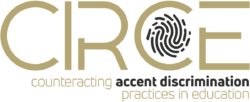CIRCE Online Training Event
Voices without borders – Embracing accent diversity in language teaching
Free online webinar for teachers and educators
Date: 26 November 2025
Time: 2 – 4 pm WET / 3 – 5 pm CET
Format: Online (Teams – link sent upon registration)
Language: English
Fee: Free, registration required
🌍 About the event
How can we make language teaching more inclusive — a space where all voices and accents are valued?
The webinar “Voices without borders – Embracing accent diversity in language teaching” explores how teachers can address linguistic diversity, accent bias, and linguistic discrimination in their classrooms.
Through expert talks and interactive discussions, we will reflect on how to:
- recognise and discuss accent bias and linguistic discrimination
- move beyond the idea of the “native speaker” as the only model
- integrate accent diversity and World Englishes into classroom practice
- foster respect and openness towards different ways of speaking English
🎙️ Speakers
- Dr. Amanda Cole, University of Cambridge
- Dr. Sonia Moran Panero, University of Southampton
- The CIRCE Project team
🧭 Who can join
This webinar is designed for:
- secondary school English teachers
- teachers of other languages interested in linguistic diversity
- student teachers, educators and trainers engaged in inclusion and global citizenship projects
No specific background knowledge is required — just curiosity and an open mind!
🧩 What you’ll gain
By the end of the session, participants will:
- discover practical ways to bring accent diversity into the classroom;
- be informed about teaching materials and classroom ideas developed by the CIRCE project;
- obtain a certificate of participation. A certificate will be issued to participants who attend at least 50% of the webinar. To request your certificate, please send an email to contact@circe-project.eu with the subject line ‘Online Webinar – Certificate Request’ and include the name you used to register for the workshop in the body of the email.
🗓️ Programme
| 3:00 – 3:10 pm CET / 2:00 – 2:10 pm WET |
🟢 Welcome and introduction Overview of the CIRCE project, its goals, and why accent diversity matters in language education. |
|---|---|
| 3:10 – 3:40 pm CET / 2:10 – 2:40 pm WET |
🎤 Talk – Dr. Amanda Cole (University of Cambridge) Is there a correct way of speaking English? Do teachers have the responsibility to model “standard” English? Is “correcting” a student’s accent harmful or just protecting good standards and maximising their potential future opportunities? In this talk, I address these questions and give an overview of how linguistic discrimination operates in the UK, including within schools. I review both seminal and recent research, demonstrating a hierarchy of how UK accents are evaluated which disfavours regional dialects, particularly from urban industrialised areas. My research, which tested how intelligent, friendly and trustworthy people from southern England are judged to be based on their accent, demonstrates how accentism reproduces and reinforces inequalities, consistently disadvantaging those who are working class, from an ethnic minority background or from stigmatised or less privileged areas. Finally, I confront the pervasive idea that we can overcome the problem of accentism by expecting people to acquire and speak standard English. We will see how this idea is not practical and that the way we speak is an important part of who we are and not something we should have to forsake. I discuss how, instead, we can confront accentism and promote regional dialects. |
| 3:40 – 4:10 pm CET / 2:40 – 3:10 pm WET |
🎤 Talk – Dr. Sonia Moran Panero (University of Southampton) Despite decades of scholarship in English as a Lingua Franca (ELF) and Global Englishes (GE) challenging the ideological dominance of the native-speaker model, such assumptions continue to shape professional and pedagogical practices within English Language Teaching. This talk draws from an international research project exploring de/colonial mindsets and practices in emerging ELT higher education contexts, which revealed the persistence of marginalising hierarchies of ‘desirable’ voices in the classroom. Responding to the need to increase practitioners’ awareness of the enduring effects of colonial ideologies surrounding language use and learning, and as part of our agenda of reciprocity, we returned to participating institutions to create spaces for critical reflection on alternative approaches to ELT and their classroom application. I discuss how the professional development sessions were designed to reconsider the roles of accent, linguistic agency, intelligibility, and identity in pedagogical practice, and examine how far these engagements fostered new understandings of linguistic diversity and informed the development of more inclusive and decolonial ELT materials. By collectively reflecting on the challenges and transformative potential of this work, the presentation seeks to contribute to ongoing discussions on linguistic discrimination, decoloniality, and teacher agency in contemporary ELT. |
| 4:10 – 4:50 pm CET / 3:10 – 3:50 pm WET |
💬 The CIRCE Handbook: Practical insights and resources for teachers (CIRCE team) This session introduces the CIRCE handbook, a vital resource for promoting linguistic equity in the classroom. Led by researchers from Italy, Germany, Portugal, and Bosnia and Herzegovina, it aims at providing language teachers with insights and practical strategies to identify and counteract language discrimination. We will share results, resources and activities from the project, focusing on inclusive pedagogies that value linguistic diversity and challenge biases. |
| 4:50 – 5:00 pm CET / 3:50 – 4:00 pm WET |
🔵 Closing remarks |
📝 Registration
Participation is free, but registration is required.
👉 Register for the webinar
Registered participants will receive the Teams link to join.
📱 Follow CIRCE on Facebook, Instagram, Spotify or subscribe to the Newsletter.
